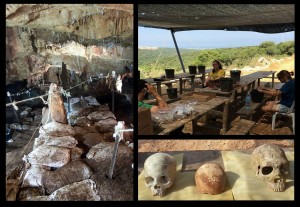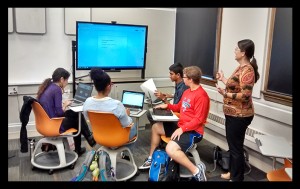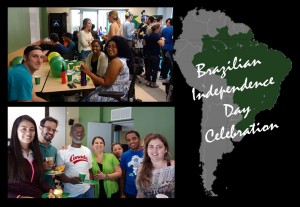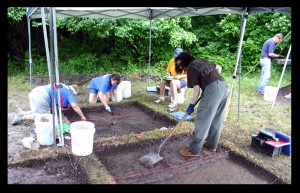
THE ANTHROPOLOGIST: FALL 2015
Special issue featuring the Summer Experiences
of Anthropology Undergraduate Students
In October, the department held a “Student Seminar on Summer Experiences” that was co-sponsored with the Anthropology Student Association. At the seminar, anthropology undergraduate students spoke about their hands-on summer research, both locally and around the world and the amazing opportunities out there for aspiring anthropology students.

From Kenya, Israel, and Ireland to
Tanzania, Vietnam, and the United States,
you can read about each experience
in this special issue of
The Anthropologist.
Diane Bernardoni in Turkana Basin, Northern Kenya
This summer Diane Bernardoni participated in the Koobi Fora Field School (KFFS), a six week program run by George Washington University and the National Museums of Kenya. During the six weeks, participants traveled to the Turkana basin in northern Kenya and learned valuable field work techniques and engaged in current research with active researchers. While Diane attended KFFS, she helped design and implement a gait mechanics experimental trial that sought to examine the effect of incline on walking and running efficiency. During the research, she was able to work closely with the Daasanach community, a local tribe by Ileret, a town in northern Kenya.

|
“My time at KFFS was an incredible experience. Not only did I get to learn firsthand what it meant to be in the field, I also got to meet many extraordinary people from very different backgrounds. Furthermore, I got to travel to the “cradle of humanity” where many fossils of our hominid ancestors are found. There is nothing more exciting for an aspiring paleoanthropologist!” -Diane Bernardoni |
Caitlin Gaffney in Glendalough, Ireland
Caitlin Gaffney participated in an archaeology field school with University College Dublin as part of her summer semester abroad. The field school was a two week session in the Glendalough Valley. Students participated in five labs during the semester learning how to do different types of surveys, geophysical recordings, environmental coring, graveyard surveys, and the basic principles of excavation such as desodding, mattocking, troweling, recording finds, and backfilling. The graveyard survey was a very important part of the field school because it incorporated the local community and allowed students to explore a different type of archaeology. This survey and the dig site were part of Ireland’s National Heritage Week which aims to build awareness and education about Irish heritage and to encourage conservation and preservation of heritage sites.

|
“I had a wonderful time and learned a lot during the field school which I would recommend to anyone. “ -Caitlin Gaffney |
Caitlin Schwarz at the Cleveland Museum of Natural History
Caitlin Schwarz, an archaeology major at CWRU, was a Kirtlandia Research Intern in the paleobotany department of the Cleveland Museum of Natural History during the summer. She worked on the management of the coal ball collection and researched the carboniferous coal swamp of Iowa. Her work included analyzing and drawing diagrams of the plant remains found in the peels from the coal balls. Through her research of the paleoenvironment and the paleoclimate of the area, she was able to create a visual reconstruction of the forest.

Amanda Slotter in Western Galilee, Israel
This July Amanda Slotter accompanied Dr. Latimer, Dr. Hans and a group of students to Manot Cave. Manot Cave is located in Western Galilee in Israel. It is the location of the evolutionary significant 2008 discovery of a 55,000 year old skull fragment. At the cave, Amanda worked alongside archaeologists, geologists, and physicists from around the world.

|
“It was an amazing experience and I’d definitely recommend other students to consider joining next year’s trip!” -Amanda Slotter |
Anthropological Student Association
The Anthropological Student Association (ASA) at CWRU is made up of undergraduates passionate about anthropology. The ASA meets bi-weekly at the Coffee House on Juniper Road to share exciting news, opportunities in the field, and plan campus events. In the past ASA has held Fair Trade sale and art auction fund-raisers for Ebola relief and Partners In Health, taken trips to the Cleveland Museum of Art and the Natural History Museum, hosted documentary screenings, and sponsored guest lectures. ASA welcomes interested undergrads to get involved this semester (leadership positions available). Contact Maggie Kuhl (mek122@case.edu) for more information. |
Rachel Sosnowchik in Dublin, Ireland
Rachel Sosnowchik spent the summer working at the European Institute of Women’s Health in Dublin, Ireland. The majority of her research was on diabetes, helping to create a comprehensive health education system for women on this subject. She also assisted in the writing of research proposals to conduct comparative studies on the state of maternal health and prenatal care in the European Union. Rachel is currently majoring in both medical anthropology and history. While in Ireland, she also conducted research funded by SOURCE for her History Senior Capstone Project on the history of family planning and contraception in Ireland during the mid-twentieth century.
Catherine Taylor in Olduvai Gorge, Northern Tanzania
Catherine Taylor was one of eight students accepted this summer into a five week field school in Olduvai Gorge, Tanzania. She spent her days at Leakey’s camp excavating at the site or cleaning, classifying, and analyzing artifacts in the lab. Catherine worked with researchers from around the world, including the local Maasai people.

|
“The five weeks I spent at field school in Olduvai Gorge, Tanzania, were indescribable. From waking up to dik diks outside my tent, to spending the day excavating or handling yesterday’s stone tool and fossil finds, to falling asleep to the sounds of distant hyenas, each day was fun and rewarding. The experience I shared at Olduvai was life changing and I would certainly recommend it to anyone interested in human evolution. -Catherine Taylor |
Tara Phuongnhi Tran in Long An, Southern Vietnam
Tara Phuongnhi Tran was the recipient of the Jonathan F. Plimpton Experiential Learning Fellowship in Anthropology. Her primary research focus was to study the business of small scale rural farms in Long An, a province in Southern Vietnam. Tara studied how these small farms work economically, from free roaming cows that were pretty much domesticated, countless flocks of geese that you could see for miles, and everything in between. Through the fellowship, she was able to develop a deeper understanding of the economics of farming in rural Vietnam from a quantitative perspective, as well as truly immersing herself in the culture there, where she learned so much about the lives of the people that worked on the farms from a more qualitative lens.

|
“This summer, I had the life-changing opportunity to travel to the remarkable country of Vietnam thanks to the Experiential Learning Fellowship in the Anthropology Department. I am incredibly excited to present my experiences in Vietnam for my senior capstone!” -Tara Phuongnhi Tran |
| Anthropology students interested in learning more about fellowships, student projects, and academic opportunities beyond the campus environment should contact Dr. Greksa (lawrence.greksa@case.edu). |
Department Administrator Kathleen Dowdell Retires
This December, after 16 years as Department Administrator, Kathleen Dowdell will be retiring. During her time at the university, Kathleen received the President’s Award for Distinguished Service in 2011 and the Robin Kramer SAC Volunteer Award in 2015, both in recognition of her extraordinary commitment and contributions to the university community. Kathleen served on the Staff Advisory Council (SAC) for over 14 years, co-chairing the Staff Training and Development Committee. During that time the committee awarded over $35,000 to staff for educational and professional goals through the Staff Educational Enhancement Fund (SEEF). In 2011 she co-founded The Garden@Case which donates its harvested food to a local hunger center. Other highlights of her career at Case include being a founding member of the Women’s Staff Leadership Development Institute, Climate Action Plan Steering Committee, Administrative Professionals Network Planning Committee, and the Staff Mentoring Circles Committee. We wish her the best!
Congratulations Barbara Reebel
After 15 1/2 years of taking classes, Barbara Reebel received her diploma at the May Commencement ceremony, graduating from Case Western Reserve University with majors in religion and sociology and a minor in film. At the Awards Ceremony prior to commencement, she received the Sylvia Green Rosenberg Award, an undergraduate collegiate award given to a part-time or full-time non-traditional student.

Ohio Theta Chapter of Lambda Alpha
The Ohio Theta Chapter of Lambda Alpha is the Anthropology National Honors Society and is available to students interested in anthropology who meet the standards of scholastic performance. Membership selection occurs twice a semester. Undergraduate students who have completed 12 credits in anthropology, have a major GPA of 3.25 and an overall GPA of 3.0 are eligible to join.
Graduate students in good departmental standing and have a GPA of 3.25 are eligible to join, as well as all graduates of anthropology within the past five years. There is a one time initiation fee of $25 for this lifetime membership. Contact Dr. Greksa (lawrence.greksa@case.edu) for membership forms. |
FACULTY NEWS
Dr. Katia Almeida
Dr. Katia Almeida is one of 16 faculty members at CWRU that received an Information Technology Services (ITS) Fellowship to participate in the third annual Active Learning Fellowship program. As part of this fellowship, Dr. Almeida re-designed her SAGES First Seminar (Brazil Inside Out) to incorporate the electronic technologies and space in Mather Memorial 125, a recently renovated classroom that promotes active learning.

Above is Dr. Almeida with a group of first-year students at a mobile teaching station in the classroom. The students are collaborating on google docs to create a cultural competency guide for CWRU students interested in studying abroad in Brazil. She is currently designing ANTH 310: Introduction to Linguistic Anthropology to be an active learning class as well.
Dr. Almeida collaborated with the Office of Education Abroad and traveled to Rio de Janeiro (Brazil) over the summer to explore study abroad possibilities. She conducted a site visit to the local office of the International Education of Students (IES) Abroad and met with the director of International Programs at the Pontifical Catholic University (PUC-Rio). In September, she organized a Brazilian Independence Day Celebration in collaboration with the Brazilian Graduate Student Organization (Rede Brasil), Educational Services for Students (ESS) and SAGES. The celebration brought together students, faculty and staff from departments across campus and is likely to become a yearly event.

Dr. Cynthia Beall
Dr. Cynthia Beall co-organized a session entitled “Evolutionary Biology Impacts on Medicine and Public Health” for the upcoming American Association for the Advancement of Science (AAAS) 2016 Annual Meeting. Dr. Beall is also the program committee chair for the 2016 International Society for Evolution, Medicine and Public Health (ISEMPH).
This is the second annual meeting of the ISEMPH and it will take place from June 22-25, 2016 in Durham, North Carolina, thanks to host Charlie Nunn and the Triangle Center for Evolutionary Medicine. Hundreds of scientists will attend, including six invited plenary speakers; Andrea Graham (Princeton), Carl Zimmer (NYC), Helen Ball (Durham, UK), Joshua Schiffman (Utah), Marion Koopmans (Erasmus) and Martin Blaser (NYU).
Dr. Atwood Gaines
Dr. Atwood Gaines published two articles in Volume 39 of Culture, Medicine, and Psychiatry; “Culture, Development and Self: the Work of Robert LeVine” in Issue 4 and “A Lion in Winter: Honoring the Life and Work of Robert B. Edgerton, Part II” in Issue 1. He also published “Diagnosis: To Tell Apart” in Diagnostic Controversy: Cultural Perspectives edited by Carolyn Smith-Morris, Routledge publishing. In Medical Anthropology Quarterly, Dr. Gaines published “Review of: Margaret Lock, The Alzheimer Conundrum,” a book review of Alzheimer Conundrum: Entanglements of Dementia and Aging. Margaret Lock, Princeton, NJ: Princeton University Press, 2013.
In addition, a volume will be appearing soon in one of Dr. Gaines two new medical anthropology book series. James Rogers’ book, Momentary Madness in East Timor, will be published in his series Cultural Studies of Science and Medicine (CSSM) at Springer.
Dr. Melvyn Goldstein
Dr. Melvyn Goldstein published the Second Installment of his Tibet Oral History Archive Project (TOHAP) that is housed online at the Library of Congress Website. TOHAP is a digital archive of oral history interviews with accompanying written transcripts (translated into English) documenting the social and political history of modern Tibet. It includes a large collection of interviews from common folk, monks, and Tibetan and Chinese officials speaking about their lives and modern Tibetan society and history.
The first two installments were conducted mainly with Tibetan political leaders, but some traders, spouses, monks and servants/managers who were active during the period from 1913-1959 were also interviewed.
The addition of the new installment brings the size of TOHAP to 42 subjects, 146 cassette tapes and just over 200 hours of interviews in Tibetan. Each interview has an English transcript and a linked glossary of special Tibetan terms. A third installment has just been submitted to the Library of Congress. The online archive can be accessed by clicking here.
Dr. Vanessa Hildebrand
In September, the DITTRICK Museum Conversations Line-Up featured anthropology graduate student Catherine Osborn and museum research associate Brandy Schillace on “‘Hard Labor’-Birth in the 19th Century” with Dr. Hildebrand as one of the discussion panelists. The talk discussed how midwifery went from almost an entirely female practice in the 18th century to nearly all male by the early 20th century and addressed the tools and techniques employed by the male doctors.
Dr. Jill Korbin
Dr. Jill Korbin is serving as president-elect of the Society for Psychological Anthropology for a 2015-2017 term and will serve as its president for 2017-2019. She also gave the keynote address at the Jacobs Foundation “Children’s Worlds Project, Future Directions” ceremony in Switzerland.
Dr. Brian Redmond
During the summer session, undergraduate student Maya Saab participated in ANTH 324: Field Methods in Archaeology and assisted with excavations at the Burrell Orchard site in Lorain County, Ohio. The project was conducted through the Cleveland Museum of Natural History and directed by Adjunct Associate Professor Dr. Brian Redmond. Of particular note was the discovery of a 4000-year old clay living floor, the first of its kind uncovered in the Ohio region. Maya assisted with all phases of the excavations and helped to document the unusual clay floor, associated storage pits, and collect numerous stone and bone implements, as well as animal and plant remains. The Burrell Orchard site is now understood to have been a large, semi-permanent settlement utilized by local hunting and gathering groups during the fall and winter months. The clay floors are thought to represent foundations for wooden post structures and various cooking and storage activities. The project was featured on Cleveland.com entitled “Museum teams unearth 4,000-year-old home in Sheffield.“

Above: Maya Saab in the field.
GRADUATE STUDENT NEWS
Todd Fennimore
Todd Fennimore received a Scholarship in Teaching (SIT) Award from the CWRU School of Medicine for his work on evaluating the workshops on interprofessionalism conducted for students of nursing, social work, medicine, and dentistry. The project was entitled “Four School Interprofessional Workshop: Exposure to Roles/Responsibilities and Teamwork.” Todd also received an appointment as an Adjunct Assistant Professor in the Center for Medical Education, Division of General Medical Sciences in the CWRU School of Medicine.
Julia Knopes
Julia Knopes is working on an ethnographic fieldwork project under the direction of Dr. Vanessa Hildebrand entitled “Observational Analysis of Anatomical Learning and Physical Diagnosis Training for First and Second Year Medical Students: A Pilot Study.” The pilot study runs through May 2016 spanning observations in the human gross anatomy lab, at a training center, and in related courses and events that explore professionalism and humanism in medical practice.
In November, Julia presented a paper entitled “Anatomizing Things: Cadavers as Objects in Western Medicine” at the Society for the Social Study of Science (4S) Meeting in Denver, Colorado. In January, she is presenting “Tools, Technologies, and Physician Authority: An Anthropological Perspective on Medical Education” as part of the Graduate Discourse and School of Medicine collaborative student lecture series. The talk will draw on her current pilot study data and discuss the formation of physician authority amongst pre-clerkship medical students through the use of rudimentary tools such as scalpels, stethoscopes, drapes, and other items.
Francis Manzella
Over the summer, Francis Manzella participated in the National Science Foundaton’s Summer Institute for Research Design. Additionally, he was awarded a Graduate Social Justice Research Fellowship through the Social Justice Institute at Case Western Reserve University for his project entitled “Transnational Healthcare in Urban Brazil.”
Allison Schlosser
In September, Allison Schlosser completed 19 months of ethnographic research on addiction treatment in Northeast Ohio. Her research began in March 2014 funded by a National Science Foundation (NSF) Doctoral Dissertation Research Improvement Grant. Her dissertation fieldwork was conducted at a residential treatment program in Akron, Ohio. She was also one of the inaugural recipients of the Graduate Social Justice Institute Fellowship at CWRU for dissertation research support. Her work combined anthropological research with a social justice orientation by ethnographically examining how addiction treatment influences clients’ socio-political inclusion and how they experience and actively respond to treatment in contexts of marginalization. Her goal is to inform both social science theory and public policy.
Graduate Discourse News
Graduate Discourse (GD) continues its tradition of being a body of unity and support for anthropology graduate students. Fall 2015 elections resulted in the selection of a new round of leadership for GD. Positions for 2015-2016 are : Julia Knopes, Administrative/Advocate Chair; Catherine Osborn & Megan Schmidt-Sane, Professional Development Chair & Social Co-Chairs; Yan Zhang, Journal Chair; Yi Li, Librarian; Sonya Petrakovitz, Graduate Council for Arts and Sciences Representative. This year, members of Graduate Discourse are collaborating with student groups in the CWRU School of Medicine to present a three-part student lecture series on medical anthropology in practice. Kristi Ninneman gave the first presentation in September on the implications of mental health anthropology for clinicians. Catherine Osborn will be presenting in December on the history and anthropology of reproductive choice as a critical issue in biomedical caregiving. Julia Knopes whose talk is on tools, technologies, and physician authority will be presenting in January 2016. These informal lectures are intended to facilitate peer-to-peer discussions between professional and graduate students about contemporary topics pertinent to both fields. This year also marks the first formal collaboration of the professional development and social representatives as co-chairs. This change reflects Graduate Discourse’s commitment to creating a collegial graduate student community where academic growth and relationships as fellow anthropologists-in-training may be mutually strengthened. |
ALUMNI NEWS
Ariel Cascio
Ariel Cascio (CWRU MA 2015) accepted a position as Visiting Lecturer in the Department of Anthropology at the University of North Carolina, Chapel Hill for the 2015-2016 academic year. In September, Ariel presented a paper entitled “Autism as a Way of Being in the Narratives of Professionals, Parents, and Youth with Autism” at the Society for Psychological Anthropology (SPA)/Lemelson sponsored workshop “Autism Spectrum Disorder in Global, Local, and Personal Perspectives: A Cross-Cultural Workshop” in Rio de Janeiro, Brazil.
Christopher Dole
Christopher Dole (CWRU PhD 2002) along with Robert Hayashi, Andrew Poe, Austin Sarat, and Boris Wolfson published The Time of Catastrophe: Multidisciplinary Approaches to the Age of Catastrophe in October 2015 by Ashgate Publishers. His book, Healing Secular Life: Loss and Devotion in Modern Turkey was also recently translated into Turkish.
Steven Folmar
Steven Folmar (CWRU PhD 1985) is an Associate Professor and Associate Chair of the Department of Cultural/Applied Anthropology at Wake Forest University. He was awarded a grant from the National Science Foundation entitled “RAPID: Social and Psychological Resilience in Post-Earthquake Nepal.” The project will study the psychological effects of the earthquakes in Nepal and how disaster victims respond to crises to help inform global disaster relief efforts, enhance the resilience of survivors, contribute to the development of mental health response efforts, and provide training for conducting similar studies.
Colleen Walsh
Colleen Walsh (CWRU PhD 2011) co-authored an article in June in the Centers for Disease Control and Prevention (CDC), Preventing Chronic Disease Volume 12 entitled “The Cleveland-Cuyahoga County Food Policy Coalition: “We Have Evolved.”

